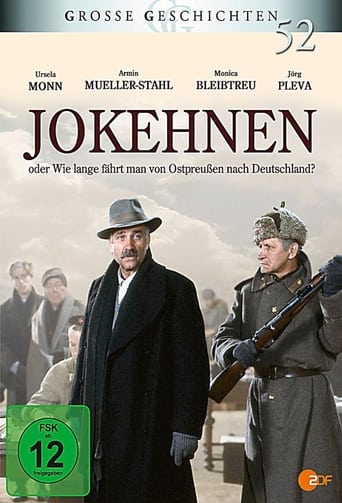
Jokehnen (1989)
It tells the story of Hermann Steputat, who was born on August 2, 1934 in Jokehnen , a fictitious East Prussian village between Rastenburg and Insterburg - on the very day that Reich President Paul von Hindenburg died and Adolf Hitler finally became an unrestricted dictator in the German Reich rises.
-

Episode 1 - Part 1
Release Date: 1989-06-21This is the story of little Hermann Steputat, the story of his father Karl and his mother Martha, and the story of the little village of Jokehnen, somewhere between Angerburg and Insterburg in East Prussia. August 1934. National Socialism is slowly penetrating the firmly established village culture. Party uniforms, badges, swastika flags, NS costumes, brown shirts, pants and other Nazi insignia increasingly determined the external image of Jokehnen. Master tailor and mayor Karl Steputat and his journeyman Heinrich hoist the swastika flag. A blouse is made for son Heinrich from the black, red and gold fabric of the Weimar flag.
-

Episode 2 - Part 2
Release Date: 1989-06-22The effects of the war are now also being felt in Jokehnen. From Corporal Dr. Hunters are brought to the village of Russian prisoners of war. They celebrate the victory of Stalingrad. In the teacher Klose's school, the residents gather to collect old clothes for the front. Hermann and Peter Aschmoneit are even successful as collectors with the conservative major. Farmer Fritz Behrend recovers from his wound on his home leave. Even the older Jokehners have to report to the military. Steputat, Uncle Franz and Schubgila are not usable, in contrast to Blonski, who, however, can prevent his deployment at the front thanks to good connections. Teacher Klose is also assigned to the troops. The young Erika Wenk takes over his school. Women and children evacuated from the city are quartered in Jokehnen. The Major dies of a heart attack.
-

Episode 3 - Part 3
Release Date: 1989-06-23Prisoner Vladimir stabs his guard, Corporal Dr. Hunter. With his comrades he flees from the SS to the east. Uncle Franz and Aunt Hedwig join a trek west. When the front reaches the village, the other Jokehners must also begin their uncertain journey on covered wagons and rack wagons. The Russians now rule in Jokehnen. The village decays. After the Poles took over Jokehnen, the German villagers must leave the village immediately. In the winter of 1945/46, the major, mother Markowski, Margarethe Schubgilla with her children, Maria and her aunt, Tulla with her mother, Else Behrend and her two children, the Wittkuhnsche with Hermann, crammed into an off-road vehicle, headed west, one towards an uncertain future.
